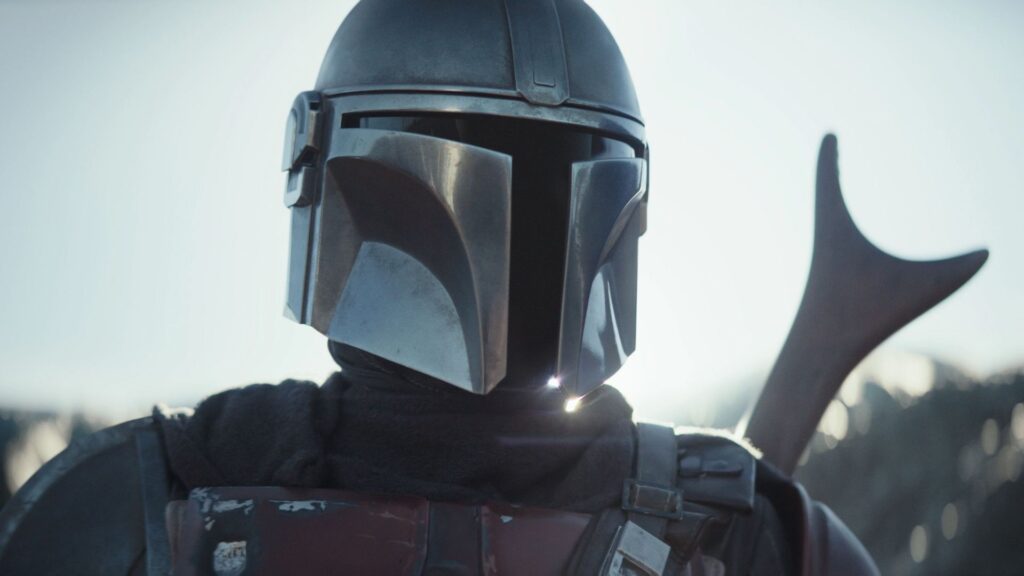The Mandalorian, the critically acclaimed Disney+ series set in the Star Wars universe, has captivated audiences with its impressive special effects and stunning visuals. One of the most striking elements of the show is the use of a virtual set called StageCraft, a massive LED wall as background, which is used to create a sense of depth and immersion in the scenes.
The use of virtual backgrounds is not a new concept in the film and television industry. In the past, these tricks primarily used green/blue chroma-key effects to create virtual sets. However, The Mandalorian has taken this technique to a new level by using a large, high-resolution curved screen to create realistic and immersive stages for the show’s scenes.
The Mandalorian performed in an immersive 20’ high by 270-degree semicircular LED video wall and ceiling with a 75’-diameter performance space.
The massive virtual set (special effects, or SFX) used in The Mandalorian is placed behind the actors and is used to project live-action footage or computer-generated imagery (CGI) of the show’s environments. This creates a sense of depth and realism that is impossible to achieve with traditional techniques.
The curved screen can also be used to project different lighting and atmospheric effects, such as fog, rain, and snow. This helps to create a more immersive experience mixed with the real-life center stage, including the improvement in details of characters’ costumes such as armors and helmets, and even the reflections on the character’s eyes, including the beloved “Baby Yoda”, Grogu.
These curved screens also allow for more flexibility and control over the environment. Instead of building expensive physical sets, the show’s creators can use StageCraft to reproduce CGI synchronized with the camera perspective, from deserts to jungles or intricate futuristic cities. This creates a high degree of realism, including intricate 3D synchronized-movement shots.
The use of VFX (visual effects) stage is becoming increasingly popular in the film and television industry. The technology is becoming more advanced and more affordable, making it accessible to a wider range of productions.
Fun facts about the LED background in The Mandalorian:
- Over 50 percent of The Mandalorian was filmed using this ground-breaking new methodology;
- The virtual stage used in The Mandalorian is one of the largest and highest-resolution screens in the entertainment industry. It is over 20′ tall and has a resolution of 8K, which is four times the resolution of a typical 4K screen;
- Digital 3D environments created by Industrial Light & Magic (ILM) played back interactively on the LED walls, are edited in real time during the shoot. This has allowed for pixel-accurate tracking and perspective-correct 3D imagery rendered at high resolution via systems powered by NVIDIA GPUs;
- The VFX is also capable of displaying a wide color gamut, which allows for more accurate and vibrant colors in the show’s environments;
- In order to match the depth and perspective, the screens are lit from behind with special LED spots that mimic the natural lighting conditions of the real-life center stage;
- The use of LED screen as background in The Mandalorian has been praised for its stunning realism and cost-effectiveness, reducing the time spent building complex scenarios and structures;
- The time-consuming-to-prepare-and-test scenarios can be reduced from days or even weeks to only a few hours, using only the center of the stage to produce the real-life acting;
- The Mandalorian is not the first Star Wars production to use a virtual-set screen as background. Rogue One: A Star Wars Story (2016) also used this tech to create the planet Scarif, which was a critical element of the film’s climax;
- The use of LED curved background is not limited to big Hollywood productions. Independent filmmakers are starting to use these screens as it becomes more affordable and accessible to do so, with scenarios and environments able to be produced and tested fully by CGI processes.
The technology and workflow required to make in-camera compositing and effects practical for on-set use combined the ingenuity of partners such as Golem Creations, Fuse, Lux Machina, Profile Studios, and ARRI, together with ILM’s StageCraft virtual production filmmaking platform and ultimately the real-time interactivity of the Unreal Engine platform.
Keep following AppleMagazine for more updates about the world of entertainment!
